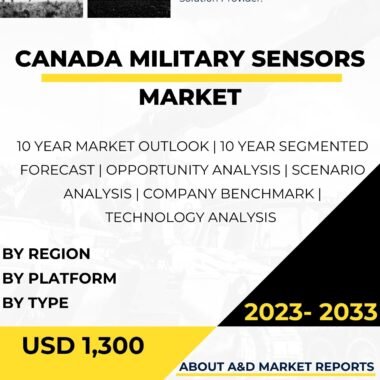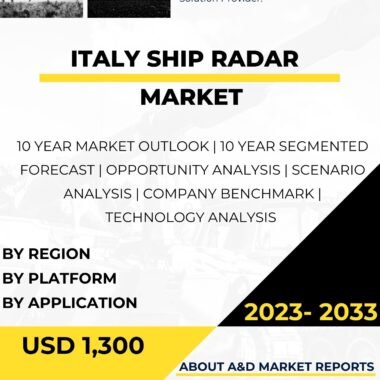Description
The Saudi Arabia Ship Radar Market is a critical and rapidly growing segment within the country’s maritime defense and navigation infrastructure. Ship radar systems play a pivotal role in ensuring the safety and security of maritime operations by providing essential capabilities such as navigation, target detection, collision avoidance, and situational awareness. As a key player in the Middle East region with a vast coastline along the Red Sea and the Arabian Gulf, Saudi Arabia recognizes the strategic importance of acquiring and developing advanced ship radar capabilities to enhance its maritime security, safeguard its maritime trade routes, and protect its territorial waters.
The Saudi Arabia Ship Radar Market is characterized by a mix of international and domestic companies that specialize in radar system development and manufacturing. International defense and technology giants, such as Thales, Raytheon, and Leonardo, have a significant presence in the market and offer a wide range of ship radar solutions.
One of the primary drivers of the Saudi Arabia Ship Radar Market is the country’s emphasis on maritime security and defense. As a nation with critical maritime trade routes and significant economic interests at sea, Saudi Arabia understands the importance of robust maritime surveillance and target detection capabilities. Ship radar systems are instrumental in detecting potential threats, monitoring vessel movements, and supporting maritime domain awareness to ensure the safety of maritime assets and activities.
Moreover, as a country with a rich maritime history, Saudi Arabia has a growing naval presence, and its naval fleet requires advanced radar systems to effectively operate and protect its territorial waters.
The Saudi government’s Vision 2030 economic diversification plan also influences the Ship Radar Market. As part of this vision, Saudi Arabia aims to develop a robust domestic defense industry capable of contributing significantly to the national economy. This includes fostering partnerships and joint ventures with international defense companies for technology transfer and knowledge sharing.
Localization of ship radar system manufacturing aligns with the broader goal of creating high-skilled job opportunities for Saudi citizens and promoting research and development within the country.
Navigation radars are essential for safe and efficient ship navigation, providing real-time data on the vessel’s position, surrounding vessels, and potential obstacles or hazards. These radars help ships avoid collisions and navigate through challenging weather conditions and congested waters.
Surface search radars are designed to detect and track surface vessels, including commercial ships, fishing boats, and potential threats, at various ranges. These radars support maritime surveillance and target identification for naval vessels and coastal defense units.
Air search radars provide early warning and detection of airborne threats, such as aircraft and drones, within a specific range. These radars are crucial for naval vessels to maintain situational awareness and respond to potential aerial threats.
Fire control radars are specialized radars used on naval ships to track and engage targets accurately. These radars support naval weapon systems and provide critical targeting information during combat operations.
The Saudi Arabia Ship Radar Market is witnessing significant technological advancements. The development of multi-function radars, phased-array radars, and active electronically scanned array (AESA) radars has transformed the radar landscape, offering higher performance, increased reliability, and enhanced capabilities.
Additionally, the integration of radar systems with other sensors and communication networks is a growing trend in the market. This integration enables data sharing and cooperative engagement among multiple naval assets, enhancing the overall effectiveness of maritime surveillance and defense operations.
The Saudi Arabia Ship Radar Market also faces challenges related to the vast and diverse maritime environment in the region. The Red Sea and the Arabian Gulf present different navigational and operational challenges, including adverse weather conditions, congested shipping lanes, and potential threats from piracy and smuggling activities.
To address these challenges and take advantage of the opportunities, the Saudi government is investing in ship radar technology and infrastructure. Upgrading naval vessels with modern radar systems, establishing coastal surveillance radars, and providing comprehensive training for naval personnel are critical elements of this effort. Additionally, the government is exploring collaborations with international radar experts to exchange best practices and adopt innovative technologies to enhance maritime security.
In conclusion, the Saudi Arabia Ship Radar Market is a vital and evolving component of the country’s maritime defense and navigation infrastructure. As the Saudi government continues to prioritize maritime security and invest in modern radar capabilities, the demand for advanced ship radar technology is expected to grow.
International radar manufacturers with expertise in maritime radar development and manufacturing will continue to play a significant role in this market. However, the Saudi government’s focus on economic diversification and indigenous defense industry development will drive increased collaboration and technology transfer initiatives.
By fostering local research and development, training programs, and investments in ship radar technology and infrastructure, Saudi Arabia aims to build a robust and self-sufficient ship radar industry, ensuring maritime safety, security, and sovereignty.
As the Kingdom seeks to enhance its maritime security, protect its territorial waters, and support its naval fleet, the Ship Radar Market will remain a critical area of focus within the broader maritime defense and security efforts.




